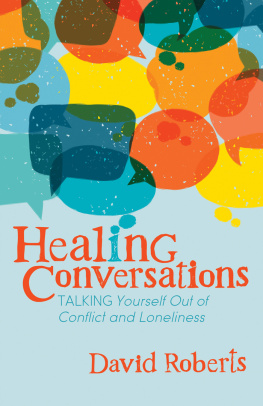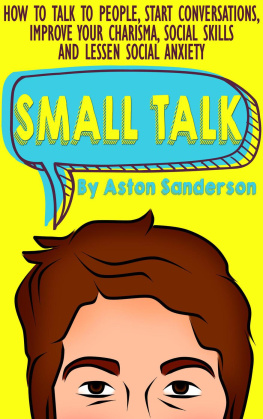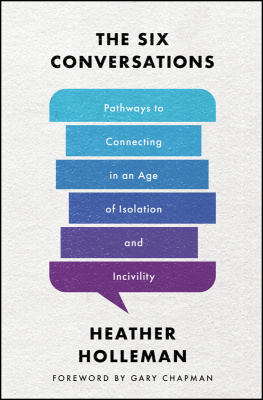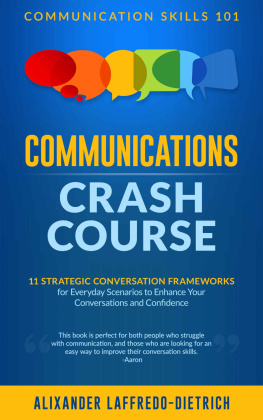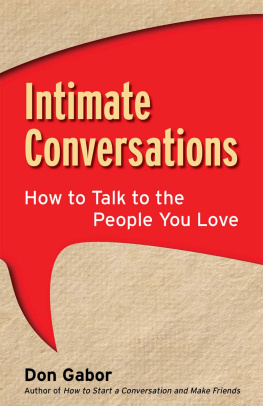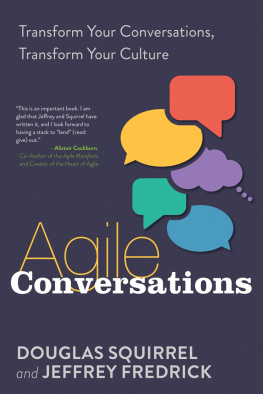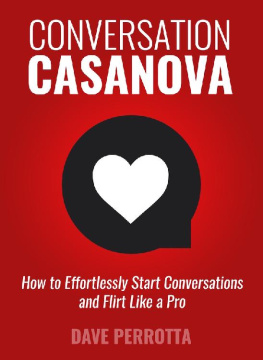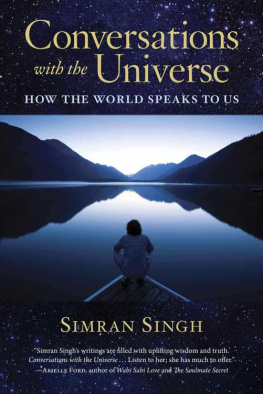Healing Conversations

David Roberts

NASHVILLE
NEW YORKLONDONMELBOURNEVANCOUVER
Healing Conversations
Talking Yourself Out of Conflict and Loneliness
2020 David Roberts
All rights reserved. No portion of this book may be reproduced, stored in a retrieval system, or transmitted in any form or by any meanselectronic, mechanical, photocopy, recording, scanning, or otherexcept for brief quotations in critical reviews or articles, without the prior written permission of the publisher.
Published in New York, New York, by Morgan James Publishing. Morgan James is a trademark of Morgan James, LLC. www.MorganJamesPublishing.com
ISBN 9781642797541 paperback
ISBN 9781642797558 eBook
Library of Congress Control Number: 2019911863
Cover Design by:
Rachel Lopez
www.r2cdesign.com
Interior Design by:
Christopher Kirk
www.GFSstudio.com
Scriptures are taken from the Holy Bible, New International Version, NIV. Copyright 1973, 1978, 1984, 2011 by Biblica, Inc. Used by permission of Zondervan. All rights reserved worldwide. www.zondervan.com The NIV and New International Version are trademarks registered in the United States Patent and Trademark Office by Biblica, Inc.

Morgan James is a proud partner of Habitat for Humanity Peninsula and Greater Williamsburg. Partners in building since 2006.
Get involved today! Visit
MorganJamesPublishing.com/giving-back
Dedication
T o all the people who have risked vulnerability to honestly share their lives and their stories, their authenticity has allowed me to learn, grow and better understand the gift and power of conversation.
Chapter 1
Its So Funny How We Dont Talk Anymore
In a world where we are able to instantly communicate with anyone at any time and any place, we seem to have less and less of substance to talk about.
I n 1979 Cliff Richard recorded a song entitled, Its So Funny How We Dont Talk Anymore. The lyrics described a couple whose relationship was ending. It seemed that at one point life was sweet and they thought their relationship was complete, but now they were throwing it away. The chorus then got to the heart of the problemfinding humor in how they stopped talking and why they stopped talking. Its a fair question to think about, though its not funny at all. Maybe it is worth asking, How did we end up not talking anymore? Why did we end up not talking anymore?
A few years ago, we were on a cruise ship in the port of Le Havre, France. My family and I were taking an excursion and met in a big theater on the ship with hundreds of others who would be taking once-in-a-lifetime trips to see some of the great wonders of the world. Imagine the potential sitting in that room. Some would tour the beaches of Normandy and surrounding countryside. Some would make their way into the interior of France and spend a day cooking and eating with a celebrated chef. Others were on their way to spend an entire day in Paris to visit The Louvre, see the Eiffel Tower, and eat at a French sidewalk cafe.
As we waited for our tour to be called an older couple a few rows in front of us began to argue. The conversation became heated. Voices rose. The intensity grew. It was clear they had reached an impasse, neither one being willing to bend. Just as it was becoming uncomfortable for those of us with front row seats to the spectacle, the couples tour was called. They were among those who were scheduled to spend just one day, a few hours really, in Paris. She stood quickly and headed for the line. He sulkily remained in his seat. Everyone waited to see who would break. She resolutely stood in line, edging closer and closer to the exit door. A last call for the tour to Paris was made. Finally, the old man stood and spoke loud enough for his wife, now in the doorway to hear, All right, Ill go, but I wont enjoy it!
Its so funny
Most of us have been there. Stuck in a relational battle where everyone loses. Whatever words were being exchanged by the couple, they were certainly not communicating. At some point there was no longer even any desire for resolution and mutual happiness. No, they were both stuck in what an author friend of mine calls, The Right-Wrong Trap. They would rather be right than be happy. Even the basic belief that my version of reality is right may speak to why it is we dont talk anymore. The longing to be right is deep and universalwe all want to be right, but too often being right leads us to dominate another and make them wrong. It moves from resolving the issue to winning and losing. We seem to move quickly into a willingness to punish and hurt. So, on a cruise ship, at a port in France, a small group of us watched a man and his wife in a tiny war and that made all of us a little miserable. Its so awful how we dont talk anymore.
Many of us having been through a few of those tiny wars have adopted a similar philosophy, All right, Ill go, but I wont enjoy it! I wont enjoy life. I wont enjoy the wonders of friends, family, good food, laughter, hope, joy and the privilege to be alive. I wont be happy. Were pretty sure its not our fault. Were right. Theyre wrong. The need to win closes us down, shuts off communication and sabotages our own happiness. We all know if we are not intentional about being thankful and focusing on the good stuff, we easily find ourselves going, but not enjoying.
To fully understand what is happening inside of us and in the people around us we would need to talk about it, and we dont talk much anymore. Its not that we dont say words, but we seldom engage in meaningful conversations that help us understand the deeper inner worlds of the people with whom we are sharing life and also to better understand ourselves. So, why dont we talk?
Theres Talk, and Then Theres Conversation
Lets define our terms. Conversation is talk between two or more people in which thoughts, feelings and ideas are expressed. One of the roots of the word, according to the Online Etymology dictionary, says that; conversation from the mid-fourteenth century means living together, having dealings with others and even the manner of conducting oneself in the world. The Latin literally means to turn together. Is that what talking is achieving for you? Do the conversations in which you engage lead to a turning together?
We Talk for Three General Purposes
First , we talk to communicate information and navigate logistical issues. Its basic stuff. When are we leaving? Whats for dinner? Do you need anything from the store? Although functional talking is basic to navigating our lives, it still requires caring attentiveness to be effective. We encounter a lot of conflict because we do not communicate the functional information clearly. Without listening and clearly articulating what we mean, functional talking can complicate the simplest of tasks. This is where many of our conversations devolve. These logistical conversations typically are not impassioned or emotional unless someone has messed up the information and we experience conflict. At those times the kind of passion that is revealed can be hostile and unsafe. If we cant safely talk about such low-level information, how will we ever approach the vulnerable space of our inner worlds?
Second , we talk to pursue an agenda. Think of this kind of conversation as debate. In all honesty, how often do we open our mouths without an agenda, a goal, and a desired outcome in mind? We have decided. We place our needs at the center of most of our conversations. Why talk at all if not in pursuit of convincing others of our point of view, or to get something, or to create an effect? Its astonishing how much of our conversations live in this space. Often, even our logistical issues can become labored by agenda-driven words and expectations. In other settings we might call that passive-aggressive behavior. We rarely speak without some idea in mind about how we expect people to respond. Underlying this kind of communication is a deep-seated belief that I get it, Im right. The world would be a better place, my family would be happier; my friends smarter, if they would just listen to me and agree!

